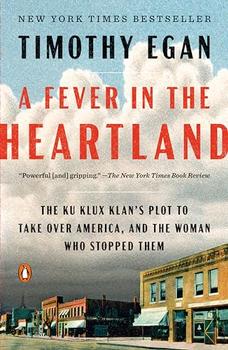Book Club Discussion Questions
In a book club? Subscribe to our Book Club Newsletter!
For supplemental discussion material see our Beyond the Book article, The Women of the Ku Klux Klan and our BookBrowse Review of A Fever in the Heartland.
Please be aware that this discussion guide will contain spoilers!
- The book opens by situating us in the "uniquely American state" of Indiana. What do you think made Indiana in the 1920s "uniquely American"? Why do you think it became particularly fertile ground for the Ku Klux Klan to take root?
- D. C. Stephenson once remarked, "I did not sell the Klan in Indiana on hatreds. I sold it on Americanism." To what extent do you think this statement was accurate? How did hatred play into Stephenson's version of American values?
- What role did disinformation serve as a tactic for the Ku Klux Klan to wrest and maintain power? How did media suppression come into play?
- Why do you think the Ku Klux Klan fought for prohibition and championed Christianity and moral purity, even as Stephenson and its leadership acted in complete disregard of these causes?
- The Ku Klux Klan carried out their reign of hate under the pretense of defending "pure Americanism." On the opposing end, the Irish American lawyer Patrick O'Donnell said that the fight against the Klan was "an American fight." What do you think it means to stand up for American values? Does patriotism differ now from what it meant in the 1920s?
- What do you think it was about Madge Oberholtzer's story that resonated so strongly with the Indiana public? After all the crimes that Stephenson had committed, why was it Madge's testimony that was finally able to take him down?
- Do you think Madge got the justice she deserved? What about Stephenson's other targets and victims?
- Throughout the book, we hear several theories accounting for Stephenson's and the Ku Klux Klan's rise. Writer Robert Coughlan suggests a blend of "the deadly tedium of small-town life," "American moralistic blood lust," and "a militant religious fundamentalism 'hot with bigotry.'" Stephenson's bodyguard Court Asher cites mass manipulation, and W. E. B. Du Bois writes of "normal human beings" who "at heart are desperately afraid of something." What do you think best accounts for the Klan's popularity? Can you think of other factors that contributed to Stephenson's and the Klan's rise?
- Consider the institutions that are typically thought to function as guardrails of democracy. How did institutions like the press, the justice system, the police, and the church all fail Indiana? And why?
- What surprised you most while reading this book?
- "Democracy was a fragile thing, stable and steady until it was broken and trampled," Timothy Egan writes. Do you think our democracy today is similarly fragile? How does Stephenson's story resonate with our current political moment? Do you see potential for history to repeat itself?
Unless otherwise stated, this discussion guide is reprinted with the permission of Penguin Books.
Any page references refer to a USA edition of the book, usually the trade paperback version, and may vary in other editions.
